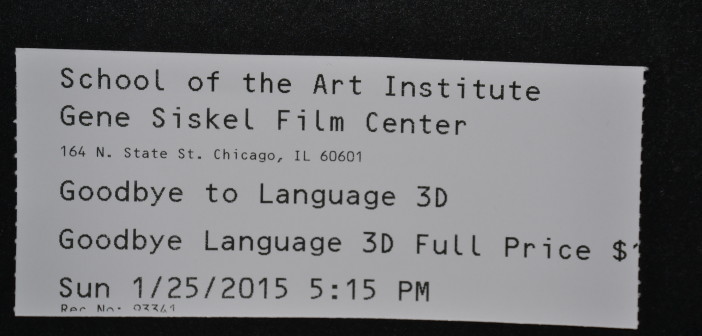Madeline Kennedy
Contributing Writer
Jean-Luc Godard, the iconic filmmaker best known for his association with the French New Wave, has released Goodbye to Language, his first feature film in four years. A winner of the 2014 Jury Prize at Cannes, it has received significant critical acclaim, and is now in limited release in select US cities. It’s an unconventional, difficult, and divisive work. It’s also playing in 3D. Goodbye to Language is truly one of a kind, and for those who enjoy a challenge, it’s absolutely worth seeing.
For viewers familiar with Godard’s earlier output, Goodbye to Language serves as a fascinating look at how his work has evolved over the decades. Now 84, Godard has spent more time making films than most of his peers have, and it shows. Goodbye to Language presents a vision of the world as only Godard could see it, featuring the innovative camerawork, political and philosophical ramblings, and pop culture references that have made his body of work so distinctive. At the same time, the film marks a departure, both through its use of 3D technology, and through its amplification of sounds, images, and ideas. It’s Godard, but louder, and more jarring. It’s a 70-minute information overload, experimental art made for the 21st century and a world with a short attention span. It’s a film that could only be made by this person, right now.
It’s also not an easy to film to watch. Goodbye to Language is so far from the mainstream that some will likely find it impenetrable; the film is chaotic, subtitled, and essentially plotless. It’s the kind of thing you either love or hate, but the film’s revolutionary use of 3D makes it truly important viewing. Typically, 3D is employed for added realism, but Godard uses it to obscure rather than clarify, weaving together images that can be difficult to process. Godard’s work has always been technically innovative, and Goodbye to Language takes this to new heights, opening up a world of possibilities for 3D filmmaking. The result of such creativity is a film that feels daring, self-assured, and radically futuristic.
Ultimately, Goodbye to Language seems to be fueled as much by a destructive urge as it is by a desire for rebirth. No longer content to merely challenge mainstream cinema, Godard has managed to breathe new life into experimental film by challenging himself. The sense of rebellion that made his early work feel so vital is still fully intact, and 55 years after Breathless, he remains as relevant as ever. Goodbye to Language is as frustrating as it is thrilling, but perhaps most importantly, it’s unlike anything else in theaters today.
Goodbye to Language is screening at Chicago’s Gene Siskel Film Center through February 5.

